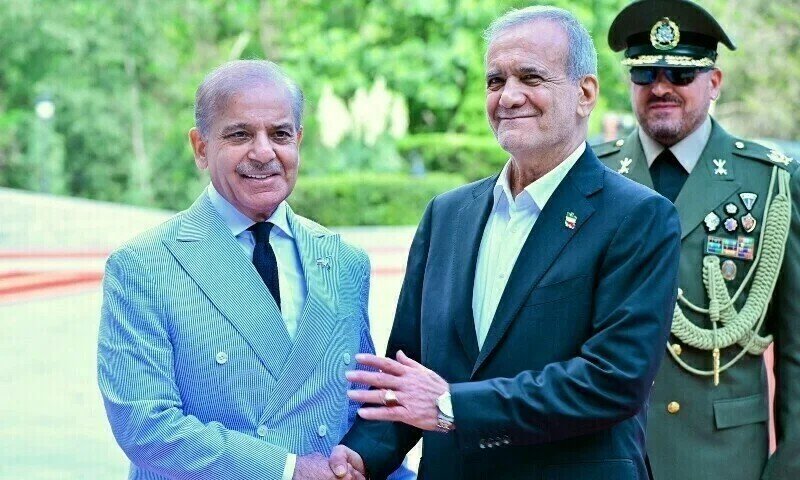Pakistan Condemns U.S. Strikes on Iran: PM Shehbaz Calls It a Grave Violation of International Law

In a move that underscores Pakistan commitment to regional peace and international law, Prime Minister Shehbaz Sharif held a telephone conversation with Iranian President Masoud Pezeshkian following recent U.S. military strikes in Iran. During the call, the Pakistani premier unequivocally condemned the attacks, calling them a “grave violation of international law” and expressing deep concern over the escalation of hostilities in the Middle East.
The conversation between the two leaders comes at a critical moment when tensions in the region are at an all-time high, following a series of airstrikes allegedly carried out by the United States targeting strategic locations in Iran. These actions have drawn widespread criticism, with many nations calling for restraint and dialogue to prevent a wider conflict.
Prime Minister Sharif emphasized Pakistan’s principled stance on sovereignty, non-intervention, and peaceful resolution of disputes. He reiterated that unilateral military actions, especially those taken without the sanction of international bodies like the United Nations, undermine global stability and set dangerous precedents.
“The recent attacks are a blatant breach of international norms. Pakistan stands in full solidarity with Iran in the face of this aggression,” Sharif reportedly told President Pezeshkian.
A Shift in Diplomatic Tone
What makes this development particularly notable is the shift in diplomatic tone from Islamabad. Just a day prior, Pakistan had surprisingly endorsed former U.S. President Donald Trump for the Nobel Peace Prize, acknowledging his role in mediating a temporary ceasefire between India and Pakistan. That gesture was seen by many as an attempt by Pakistan to reset ties with the West while maintaining its strategic autonomy.
However, the recent American actions have forced Pakistan to take a more assertive stance in favor of regional partners like Iran. Analysts believe this signals a recalibration in Pakistan’s foreign policy — one that prioritizes principles over expediency, especially when issues of sovereignty and international law are at stake.
Iran-Pakistan Relations: A Delicate Balance
The call between Sharif and Pezeshkian also reaffirms the enduring yet delicate relationship between Pakistan and Iran. While the two countries share a long border and historical ties, their relationship has often been complicated by competing interests in regional geopolitics and differing alliances.
Nonetheless, the Prime Minister’s outreach suggests a willingness to strengthen bilateral cooperation in the face of shared threats. Sources close to the matter indicated that the two leaders discussed avenues for increased intelligence sharing, border security coordination, and joint efforts to oppose foreign intervention in the region.
International Response and Implications
Following the phone call, Pakistan’s Foreign Office released a strongly worded statement urging all parties to exercise restraint and avoid actions that could further destabilize the region. The statement warned that continued escalation could trigger unintended consequences, including humanitarian crises and the breakdown of diplomatic channels.
The global response to the U.S. strikes has been mixed. While traditional U.S. allies in Europe have expressed concern but stopped short of outright condemnation, several nations in Asia and the Middle East have voiced strong opposition. China, Russia, and Turkey have all issued statements criticizing the U.S. for what they termed as “reckless” behavior.
For Pakistan, this moment presents both a challenge and an opportunity. On one hand, it must navigate its complex relationships with both Western powers and neighboring countries like Iran and China. On the other, it has a chance to assert itself as a principled regional actor committed to international law and diplomatic solutions.
Domestic Reaction in Pakistan
Domestically, the government’s condemnation of the U.S. strikes has been met with widespread support. Large-scale protests erupted in several major cities, including Karachi, Lahore, and Islamabad, where demonstrators expressed solidarity with the Iranian people and called for an end to American military interventions in the region.
Civil society groups, political parties, and religious leaders also voiced their backing of the Prime Minister’s stance, praising the government for not remaining silent in the face of what they view as imperial aggression.
Conclusion
The recent events mark a significant moment in regional diplomacy. Prime Minister Shehbaz Sharif’s call to President Pezeshkian and his strong denunciation of U.S. military actions demonstrate Pakistan’s evolving foreign policy — one that seeks balance, sovereignty, and peace in an increasingly polarized world. As tensions continue to rise, all eyes will be on how regional powers, including Pakistan, shape the next chapter in Middle Eastern geopolitics.
Reference: وزیر اعظم شہباز شریف کا ایرانی صدر کو فون ، امریکی حملے عالمی قوانین کی سنگین خلاف ورزی قرار
